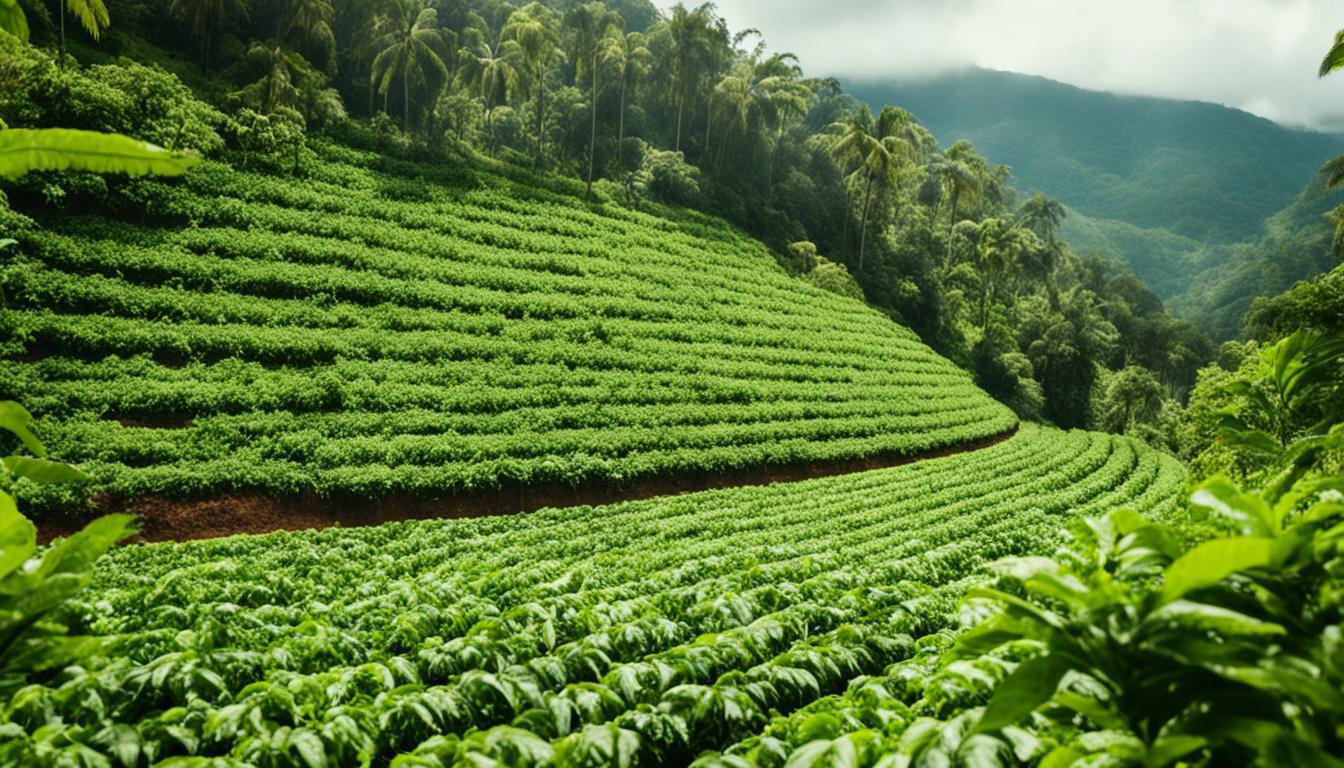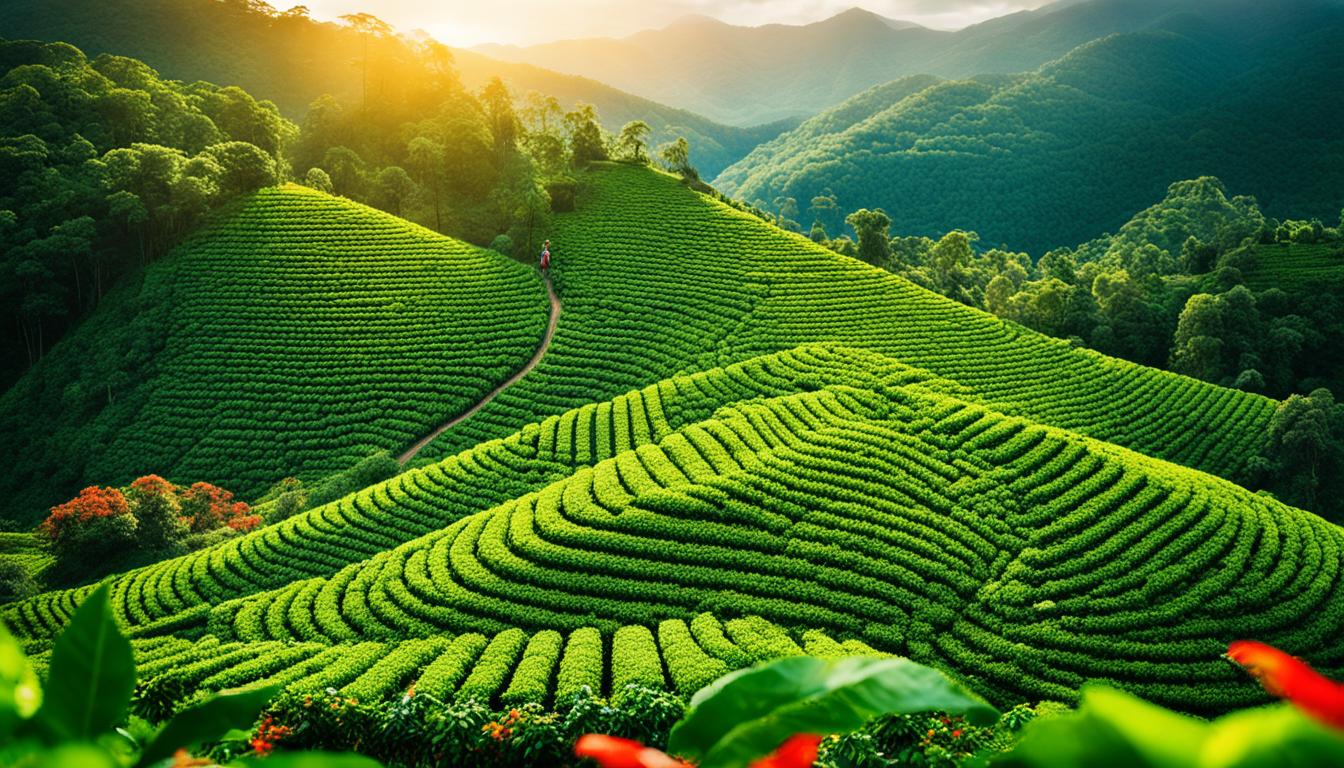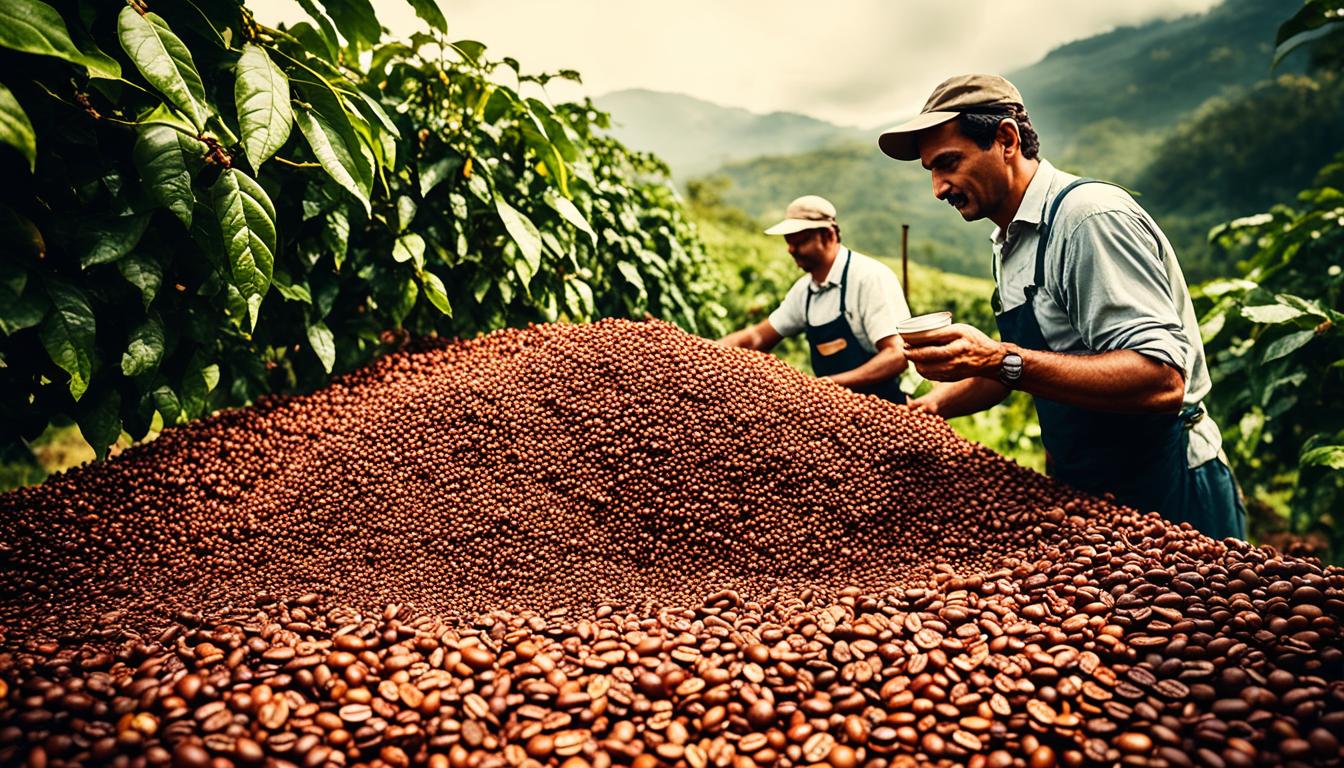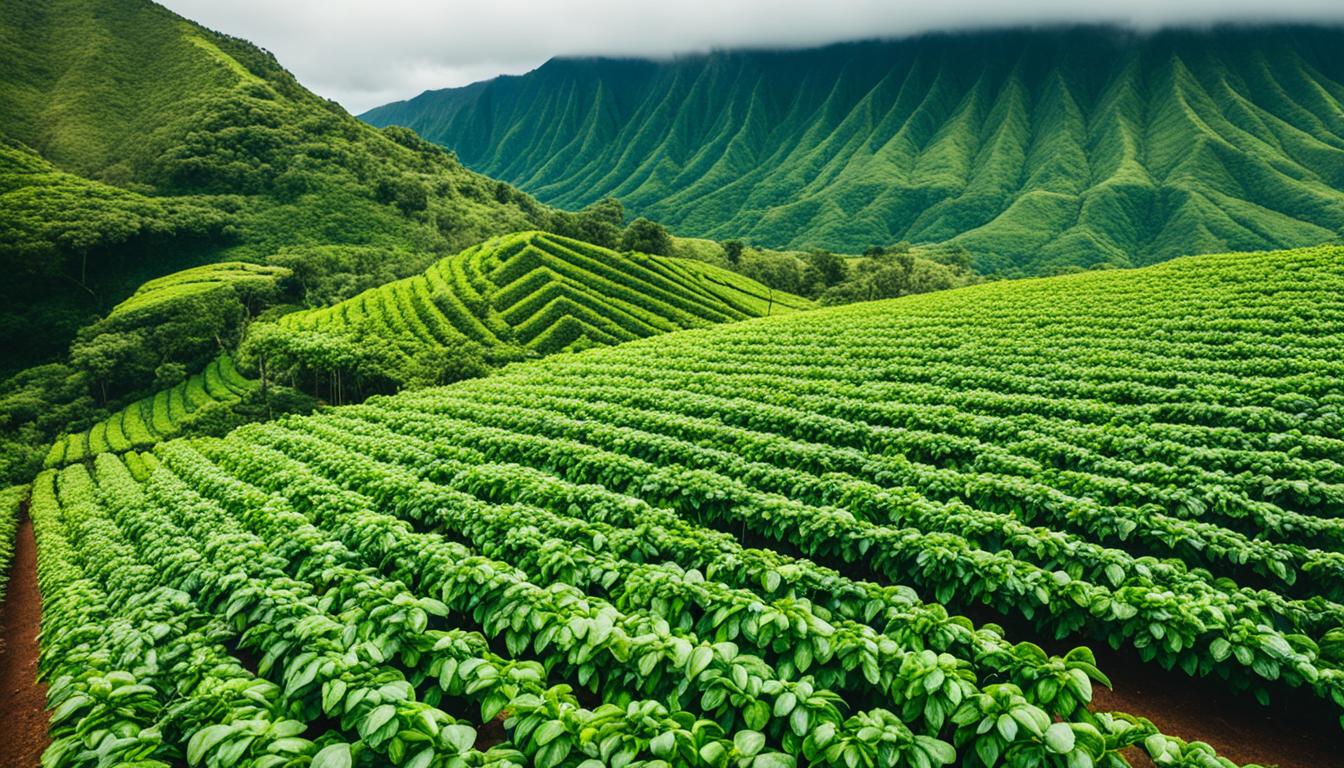Welcome to our comprehensive guide on sustainable coffee growing practices! At [Brand Name], we believe that eco-friendly coffee farming, organic coffee cultivation, and fair trade coffee production are crucial for a greener and more sustainable future for coffee. By implementing these practices, we can minimize our environmental impact and promote sustainability in the coffee industry.
Key Takeaways:
- Sustainable coffee growing practices focus on eco-friendly methods, organic cultivation, and fair trade production.
- These practices aim to reduce environmental impact and promote sustainability in the coffee industry.
- By adopting sustainable coffee farming techniques, we can protect natural resources and conserve biodiversity.
- Sustainable coffee production improves social and economic conditions for coffee farmers and their communities.
- As consumers, we have the power to support sustainable coffee brands and promote environmental stewardship in the industry.
Principles and Practices for Sustainable Green Coffee Production
At the heart of sustainable coffee production lies a dedication to practices that uphold economic, social, and environmental sustainability. By adhering to these principles, coffee farmers can prioritize the long-term well-being of their farms, communities, and the planet as a whole.
Sustainable Farming Systems
Implementing sustainable farming systems forms the foundation for environmentally conscious coffee production. This involves adopting techniques that minimize the use of synthetic inputs, protect soil fertility, and promote biodiversity conservation. By selecting suitable coffee varieties and implementing nutrient management strategies, farmers can ensure optimum crop health while reducing environmental impact.
Economic Sustainability
Economic sustainability is a crucial aspect of sustainable coffee production. It involves establishing fair trade practices, supporting farmer livelihoods, and promoting equitable relationships throughout the supply chain. By offering fair prices for their coffee, coffee farmers can access the financial resources needed to invest in sustainable practices and improve their overall economic stability.
Social Sustainability
Social sustainability focuses on enhancing the well-being of coffee-growing communities and promoting inclusive practices. This includes providing safe working conditions, fair wages, and access to education and healthcare for coffee farm workers. By fostering social sustainability, coffee farmers contribute to the overall development and empowerment of their communities.
Environmental Sustainability
Environmental sustainability is a core pillar of sustainable green coffee production. It involves practicing resource-efficient methods to minimize the environmental footprint of coffee farming. This includes efficient water management, energy usage, waste disposal, and the promotion of biodiversity conservation. By safeguarding natural resources and reducing ecological impact, coffee farmers play a crucial role in preserving the planet’s delicate balance.
| Key Practices for Sustainable Green Coffee Production | Benefits |
|---|---|
| Selecting suitable coffee varieties | Enhanced crop resilience and quality |
| Implementing nutrient management strategies | Improved soil health and fertility |
| Practicing integrated pest management | Reduced reliance on synthetic pesticides |
| Promoting biodiversity conservation | Preservation of natural habitats and ecosystems |
| Efficient water management | Reduced water usage and conservation |
| Energy-efficient practices | Minimized energy consumption and carbon footprint |
| Waste management and disposal | Reduction of environmental pollution |
We believe that by adhering to these principles and practices, coffee farmers embrace a responsibility to protect the environment, support thriving communities, and ensure the longevity of the coffee industry. Sustainable green coffee production not only produces superior quality coffee but also contributes to a more sustainable future for all.
Environmental Impact of Coffee Production
When it comes to coffee production, we must acknowledge the significant environmental impact it has. From water usage to deforestation, climate change to biodiversity loss, and soil erosion, the coffee industry poses various challenges to our planet’s health.
Let’s start by looking at water usage. Did you know that the water footprint of a single cup of coffee is substantial? Considering the vast amount of coffee consumed worldwide, this equates to a significant demand for water resources. As a result, sustainable water management practices in coffee production are vital to ensure responsible water usage.
Another pressing issue is deforestation. As coffee farms expand, vast areas of forests are cleared to make way for coffee cultivation. This deforestation not only leads to the loss of valuable habitats but also exacerbates climate change. Trees play a crucial role in carbon sequestration, helping to mitigate the effects of greenhouse gas emissions. By preserving forests and adopting sustainable land-use practices, we can combat deforestation and its associated environmental consequences.
The consequences of climate change pose additional threats to coffee production and wild coffee species. Rising temperatures and changing weather patterns can disrupt the delicate balance required for optimal coffee growth. Moreover, increased pest and disease pressures driven by climate change further compromise coffee crops. To safeguard the future of coffee farming, it is imperative to address climate change through sustainable practices.
Biodiversity loss is yet another consequence of coffee production. The expansion of coffee farms often leads to the destruction of natural habitats, resulting in the displacement or extinction of numerous plant and animal species. Preserving biodiversity is essential for maintaining a healthy ecosystem and ensuring the resilience of coffee farming against pests, diseases, and environmental changes.
Additionally, soil erosion is a significant concern in coffee production. Conventional farming methods can deplete soil fertility and expose it to erosion, leading to long-term degradation of agricultural land. Implementing sustainable soil management practices, such as cover cropping and composting, helps maintain soil health and prevent erosion, ultimately supporting the long-term viability of coffee farming.
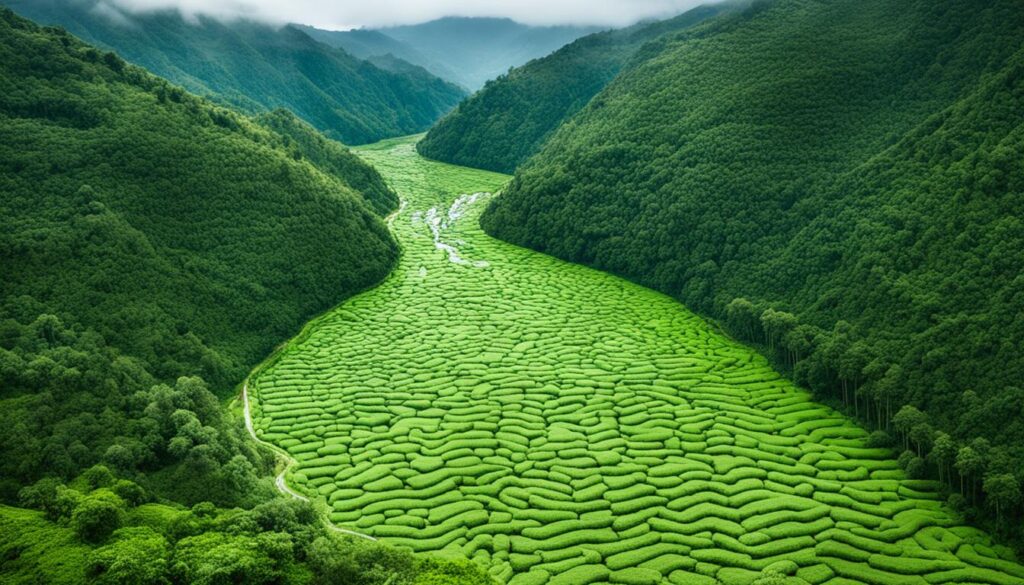
The Environmental Impact of Coffee Production: A Visual Overview
| Environmental Impact | Description |
|---|---|
| Water Usage | Coffee production requires significant water resources, contributing to water scarcity in some regions. |
| Deforestation | The expansion of coffee farms leads to the clearing of forests, contributing to habitat loss and climate change. |
| Climate Change | Rising temperatures and changing weather patterns pose threats to coffee production and wild coffee species. |
| Biodiversity Loss | The destruction of natural habitats for coffee farming leads to the displacement and extinction of plant and animal species. |
| Soil Erosion | Conventional farming practices in coffee production can deplete soil fertility and cause long-term erosion. |
To mitigate these environmental issues and safeguard the future of coffee farming, promoting sustainable coffee growing practices is crucial. By adopting eco-friendly farming techniques, such as organic and shade-grown coffee cultivation, efficient water management, and responsible land-use practices, we can minimize the negative impacts of coffee production and contribute to a more sustainable future for coffee.
Labels and Certifications for Sustainable Coffee
Consumers can identify sustainable coffee through various labels and certifications. These certifications ensure that coffee farms meet specific standards, guaranteeing that the coffee they produce is environmentally friendly and promotes social responsibility. Let’s take a closer look at some of the most reputable certifications:
1. Rainforest Alliance Certified
The Rainforest Alliance certification is one of the most recognized and trusted labels for sustainable coffee. It sets comprehensive standards for coffee farms, focusing on environmental conservation, worker welfare, and community development. By choosing Rainforest Alliance certified coffee, you can support sustainable farming practices that prioritize biodiversity conservation and the well-being of farmers and local communities.
2. Shade-Grown Coffee
Did you know? Shade-grown coffee is cultivated under a natural canopy of trees, mimicking the coffee plants’ natural habitat. This method not only preserves the delicate ecosystems of rainforests but also provides vital habitat for migratory birds. By opting for shade-grown coffee, you contribute to carbon sequestration and support biodiversity conservation.
3. Organic Coffee
Organic coffee refers to beans grown without the use of synthetic pesticides, herbicides, or chemical fertilizers. By choosing organic coffee, you support environmentally friendly farming practices and help minimize the impact of agricultural chemicals on ecosystems and freshwater resources. Additionally, organic farming promotes soil health and biodiversity.
4. Bird-Friendly Certification
The bird-friendly certification, established by the Smithsonian Migratory Bird Center, focuses on coffee farming practices that enhance bird habitats and protect ecosystem health. It ensures that coffee farms maintain a healthy canopy cover and eliminate the use of harmful pesticides. By choosing bird-friendly certified coffee, you play a crucial role in safeguarding bird populations and promoting sustainable agriculture.
To help you understand the certifications better, here’s a comparative presentation:
| Certification | Description |
|---|---|
| Rainforest Alliance Certified | Guarantees environmental sustainability and worker welfare. |
| Shade-Grown Coffee | Cultivated under a natural tree canopy, supporting biodiversity and carbon sequestration. |
| Organic Coffee | Grown without synthetic pesticides, preserving ecosystems and promoting soil health. |
| Bird-Friendly Certification | Focuses on maintaining bird habitats and ecosystem health. |
By choosing coffee with sustainable labels and certifications, we can make a positive impact on the environment, biodiversity, and the lives of coffee farmers. Let’s support coffee that is both delicious and sustainably produced!
Strategies for Sustainable Coffee Farming
Sustainable coffee farming involves implementing various strategies to promote environmental and social sustainability. By adopting these practices, we can ensure the long-term viability of coffee farming while minimizing our impact on the planet. Here are some key strategies for sustainable coffee farming:
Crop Management
Effective crop management practices play a crucial role in sustainable coffee farming. Instead of relying on harmful pesticides, coffee farmers can use pheromone traps and natural pest control methods to protect their crops from pests and diseases. This approach minimizes the use of chemicals, reduces environmental pollution, and promotes the health of ecosystems.
Water Conservation
Water is a valuable resource, and efficient water conservation techniques are essential for sustainable coffee farming. Coffee farmers can implement efficient irrigation systems and reuse wastewater to minimize water usage. By conserving water, we can ensure its availability for future generations and reduce the strain on local water sources.
Waste Reduction
Waste reduction is another critical aspect of sustainable coffee farming. Instead of discarding coffee waste, farmers can compost it to create organic fertilizer. This not only reduces waste but also promotes soil health and fertility. Additionally, farmers can explore innovative ways to repurpose coffee by-products, such as using coffee husks for fuel or incorporating them into sustainable packaging materials.
Agroforestry
Agroforestry is a sustainable farming practice that combines coffee cultivation with shade trees. This approach enhances biodiversity by providing habitats for diverse plant and animal species. Shade trees also help regulate microclimates, conserve soil moisture, prevent soil erosion, and improve coffee quality. By embracing agroforestry, we can create a harmonious balance between coffee production and environmental conservation.
Integrated Landscape Management
Integrated landscape management considers the holistic management of coffee farms within broader landscapes. It involves collaborating with local communities, government agencies, and other stakeholders to develop sustainable land use plans. By protecting natural resources, preserving biodiversity, and promoting sustainable livelihoods, integrated landscape management ensures the long-term sustainability of coffee farming.
By implementing these strategies, coffee farmers can make a positive difference in the world of coffee production. Sustainable coffee farming not only protects the environment and supports local communities but also enables us to enjoy a delicious cup of coffee without compromising our future.
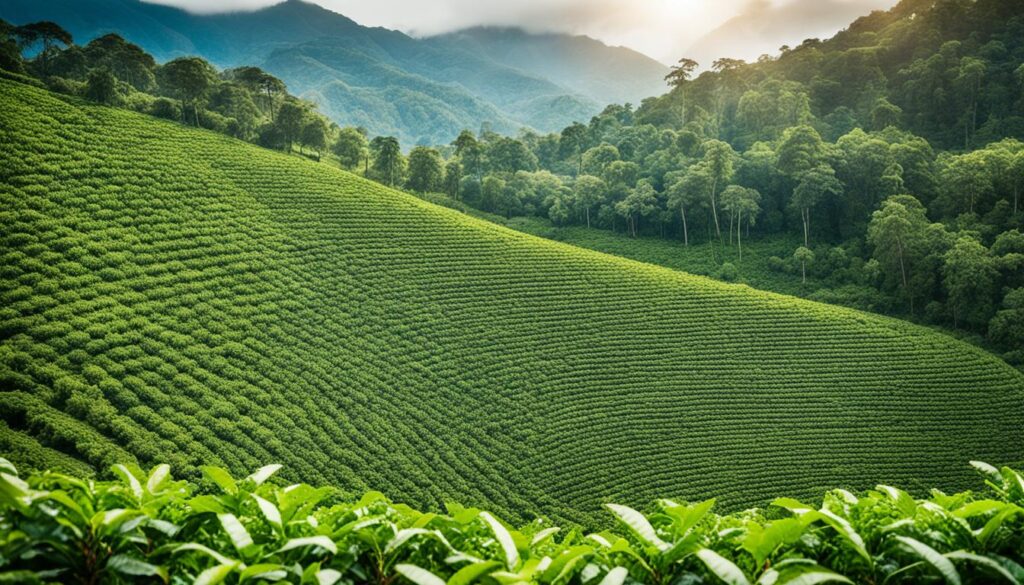
Conclusion
Sustainable coffee production plays a crucial role in mitigating the environmental impact of coffee farming and ensuring the long-term viability of the coffee industry. By adopting eco-friendly farming techniques, coffee farmers can protect natural resources, conserve biodiversity, and promote soil health. This commitment to sustainable practices not only benefits the environment but also enhances the livelihoods of coffee farmers, improving social and economic conditions in coffee-growing communities.
As responsible consumers, it is vital for us to support sustainable coffee brands and make conscious choices that promote environmental stewardship in the coffee industry. By opting for sustainably produced coffee, we can contribute to the preservation of our planet and support the farmers who work tirelessly to cultivate this beloved beverage. Our choices can make a significant impact on the future of coffee production and the well-being of farming communities worldwide.
Let us come together and embrace our role as stewards of the environment and supporters of farmer livelihoods. By choosing sustainable coffee production, we not only savor a great cup of coffee but also contribute to a greener and more sustainable future for this beloved beverage. Together, we can create positive change and ensure that the art of coffee-making continues to flourish with respect for our planet and those who dedicate their lives to its cultivation.
FAQ
What are sustainable coffee growing practices?
Sustainable coffee growing practices involve adopting eco-friendly and sustainable methods in coffee farming. These practices focus on organic coffee cultivation, fair trade production, and environmentally conscious farming techniques to reduce environmental impact and promote sustainability in the coffee industry.
What are the principles and practices for sustainable green coffee production?
The principles and practices for sustainable green coffee production cover various aspects of coffee production, including sustainable farming systems, economic sustainability, social sustainability, and environmental sustainability. Key practices include selecting suitable coffee varieties, implementing nutrient management strategies, practicing integrated pest management, and promoting biodiversity conservation.
What is the environmental impact of coffee production?
Coffee production has a significant environmental impact, contributing to deforestation, climate change, and soil erosion. Coffee farms also lead to biodiversity loss and the destruction of natural habitats. Additionally, the effects of climate change pose threats to coffee production and wild coffee species.
How can consumers identify sustainable coffee?
Consumers can identify sustainable coffee through various labels and certifications. The Rainforest Alliance certification ensures that coffee farms meet environmental and social standards, while shade-grown coffee is cultivated under a natural canopy of trees. Organic coffee indicates beans grown without synthetic pesticides and fertilizers, and bird-friendly certification focuses on supporting bird habitats and ecosystem health.
What are the strategies for sustainable coffee farming?
Strategies for sustainable coffee farming include effective crop management practices, water conservation techniques, waste reduction, agroforestry, and integrated landscape management. These strategies promote environmental and social sustainability, biodiversity conservation, and soil health.
Why are sustainable coffee growing practices important?
Sustainable coffee growing practices are crucial for mitigating the environmental impact of coffee production and ensuring the long-term viability of the coffee industry. These practices protect natural resources, conserve biodiversity, and promote soil health. Sustainable coffee production also enhances farmer livelihoods and improves social and economic conditions in coffee-growing communities.

